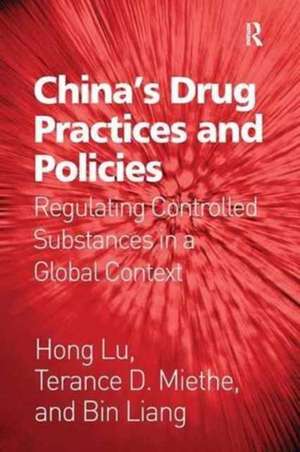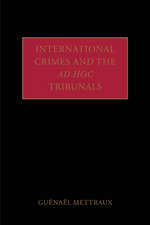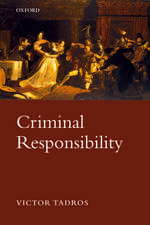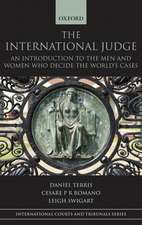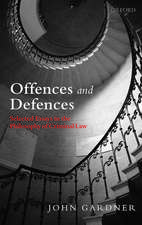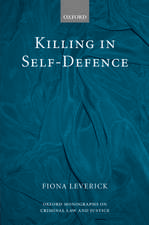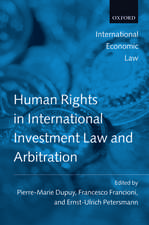China's Drug Practices and Policies: Regulating Controlled Substances in a Global Context
Autor Hong Lu, Terance D. Miethe, Bin Liangen Limba Engleză Paperback – 16 noi 2016
| Toate formatele și edițiile | Preț | Express |
|---|---|---|
| Paperback (1) | 489.26 lei 43-57 zile | |
| Taylor & Francis – 16 noi 2016 | 489.26 lei 43-57 zile | |
| Hardback (1) | 1061.06 lei 43-57 zile | |
| Taylor & Francis – 21 sep 2009 | 1061.06 lei 43-57 zile |
Preț: 489.26 lei
Nou
Puncte Express: 734
Preț estimativ în valută:
93.62€ • 97.99$ • 77.92£
93.62€ • 97.99$ • 77.92£
Carte tipărită la comandă
Livrare economică 31 martie-14 aprilie
Preluare comenzi: 021 569.72.76
Specificații
ISBN-13: 9781138278523
ISBN-10: 1138278521
Pagini: 272
Dimensiuni: 156 x 234 x 20 mm
Greutate: 0.45 kg
Ediția:1
Editura: Taylor & Francis
Colecția Routledge
Locul publicării:Oxford, United Kingdom
ISBN-10: 1138278521
Pagini: 272
Dimensiuni: 156 x 234 x 20 mm
Greutate: 0.45 kg
Ediția:1
Editura: Taylor & Francis
Colecția Routledge
Locul publicării:Oxford, United Kingdom
Notă biografică
Hong Lu is an Associate Professor in the Department of Criminal Justice at the University of Nevada, Las Vegas, and has written extensively on international and comparative criminology and law. She is the co-author of Punishment: A Comparative Historical Perspective (Cambridge University Press, 2004) . Terance D. Miethe is a Professor in the Department of Criminal Justice at the University of Nevada, Las Vegas. With Hong Lu, he co-authored Punishment; his other books include China's Death Penalty: History, Law, and Contemporary Practices (Taylor & Francis, 2007). Bin Liang is an Associate Professor in the Department of Sociology at Oklahoma State University-Tulsa. He is the author of The Changing Chinese Legal System, 1978-Present: Centralization of Power and Rationalization of the Legal System (Routledge, 2007).
Recenzii
'Empirically grounded and theoretically engaged, the authors deliver a deep and compelling analysis of China and its part in the international web of regulatory developments on drug control. A century on from the start of the global war on drugs, with the Shanghai meetings of the International Opium Commission in 1909, this timely and scholarly analysis will be a key reference for many years to come. It deserves the widest possible audience.' Bill Hebenton, University of Manchester, UK 'The issue of drug use and abuse requires understanding, and it is understanding that is in short supply these days. Lu, Miethe and Liang’s new book contributes to an understanding of drug practices and policies within the convulsive and complex historical context of China.' Liqun Cao, University of Ontario Institute of Technology, Canada 'Lu, Miethe and Liang provide a comprehensive, sophisticated analysis of the consumption and regulation of opiates in China across three historical periods. Through meticulous research, they demonstrate how changing social, political and economic conditions shaped the nature of opium use and its regulation over time. China’s experience offers important lessons for understanding the contemporary global context of drug control, making this clearly written book especially valuable to social scientists, policy makers, and students alike.' Marjorie S. Zatz, Arizona State University, USA 'This book makes an important contribution to the literature of drug regulation in China, and provides a useful theoretical framework and methodologies for understanding institutional arrangements of drug control with intensive and informative evidence. Academic researchers, legislators, health policy makers and even the general public would learn a lot form this book.' Asian Criminology
Cuprins
Chapter 1 The Consumption and Control of Illegal Substances; Chapter 2 Social Conditions and Opium in Imperial China (Pre-1911); Chapter 3 Drug Laws and the Social Context in the Republic Era; Chapter 4 Narcotics Control in the People’s Republic of China; Chapter 5 Theoretical Issues and Explanations of China’s Drug Laws; Chapter 6 Fighting Narcotic Drugs in a Global Context;
Descriere
Employing a comparative historical approach and drawing on a variety of data sources, this book is the first English-language publication to provide a comprehensive analysis of China's legal regulation of controlled substances. The authors examine topics including drug regulation, the socio-political treatment of drugs during various historical periods and ongoing efforts to legislate drug trade, criminalize drug use and manage the addict population within national and international contexts.
